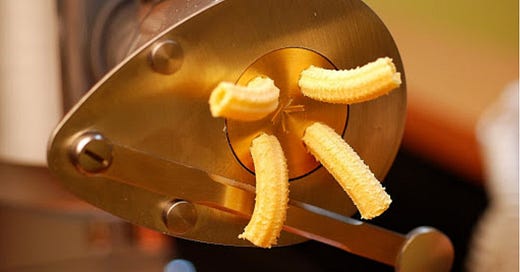The holiday season is the Super Bowl of cooking, trust me, I’m a rabid football fan (Go Bills). Because we’re eight weeks from Thanksgiving, I’m getting inundated with texts sharing front page articles about cooking. One in particular caught my eye this weekend and I couldn’t wait to put it through the extruder. Off we go…
Allrecipes, America’s Most Unruly Cooking Web Site
Please read this whole article. Ruby Tandoh deftly weaves together threads of history, community, and cuisine through the unexpected lens of a recipe website. It tracks the rise (and fall?) of Allrecipes.com from a small project started by students at the University of Washington through its sale to Dotdash Meredith, a media conglomerate that owns Food & Wine, The Spruce Eats, Serious Eats, etc.
There are two parts of this article I found fascinating; the early insights from the team, and the broader cultural reflections. The team’s three big learnings post-launch were:
(1) Family recipes are treasured.
(2) People love sharing their recipes.
(3) Digital recipes need to be searchable and adaptable, not simply static blocks of text.
Hmm. This sounds very familiar.
(1) Family recipes are treasured. Receipt: Every single time I speak to a potential Roux user, they get excited about preserving family recipes. They are sacred. Nothing comes up more frequently.
(2) People love sharing their recipes. Receipt: In 2001, Allrecipes was the most popular site on the internet. Today, it has 40 million monthly visitors and lest we forget, 50% of Instagram’s content is food-related. Hey Metcalfe, what’s the value of that network?
(3) Digital recipes need to be searchable and adaptable, not just static blocks of text. Receipt: The case for consumers confirms that culinary flexibility—in both recipe discovery and adaptation—is not merely a consumer preference, but a basic requirement. Any product that wants to be in today's kitchen must embrace these fundamentals.
The author also offers insightful commentary on the broader landscape of food culture.
(1)"Tech has been trying, and mostly failing, to improve on traditional cookbooks for a long time." Allrecipes was ahead of the game with its data model, which allowed for scalable, adaptable recipes and smart search functions. But after being acquired, much of that innovation was discarded (smh). Why is it that the industry keeps ignoring how people actually want to cook?
(2) "Even a great cook may be inept at recipe writing, a complex exercise that involves carefully recording your work and anticipating any of the million places where an amateur might slip up." Recipe quality is important! Recipe writing is hard! Roux’s community ranked recipe quality the most important factor in choosing a recipe source.
(3) “Community cookbooks circulated by rotary associations, Girl Scout troops, synagogues, churches, sororities, and military wives’ circles are perhaps the most prolific expression of American culinary thought.” The digital revolution of the past two decades has fundamentally altered our social fabric and modes of connection. Without adapting how we share culinary heritage to these new paradigms, we risk not only failing to preserve our food cultures, but also missing crucial opportunities for their evolution and enrichment.
Allrecipes tapped into something profound: recipes aren't just instructions for cooking, they're living, breathing cultural artifacts that tell the story of who we are and where we come from. Cindy Carnes’s Banana Cake VI doesn’t simply feed our bodies—it nourishes our souls with memories and tradition (there’s a reason the language around the subscribe button here is “If you subscribe, I might give you my mom’s chocolate cookie recipe”).
But as our world becomes increasingly digital, we need to find new ways to not only keep these culinary connections alive, but evolve them. Technology is at its best when building expansive, vibrant communities that transcend geographical boundaries and generational gaps. The right technology gives us the tools to connect culinary heritage and traditional techniques with cutting-edge creativity; where every cook is both a student and a teacher.
Now, let's talk about the elephant in the room, ahem, kitchen—the cycles of tech products that started off promising and ended… well, let’s just say they ended. It's insanely frustrating, especially for those of us who've been in both the food and tech worlds for years. It's time to break this cycle and create something that stays true to its roots, something that doesn't sacrifice soul for scale. Recipes are not just ad real estate, they are the foundation of food culture.
Here's where I get excited (if you couldn’t already tell). Instead of chasing likes and follows, Roux focuses on the genuine exchange of knowledge and inspiration. We are building a platform that doesn’t just last but continually evolves like the culinary world itself, where we can honor our food heritage while also pushing it forward, creating new traditions for future generations. We’re not just another recipe app; we’re powering a new era of culinary creativity and collaboration. So like they say… let them cook.
Food for Thought
Team family recipe or Team professional recipe? Let me know in the comments.



Team family recipe for when I'm chasing that specific hit of culinary nostalgia only my mom's midwestern cooking can satiate. Team professional recipe for personal growth and development as a human who has a good and expanding relationship with food. Every time I discover a solid recipe that works for me, regardless of camp of origin, it is truly a thrill. Something about knowing exactly what kind of chocolate chip cookie to make in a pinch makes me feel so calm. Maybe the midwesterner in me, but I know I'm gonna need a slew of homerun foods I can make for any kind of life event or emergency. I'm losing my own plot, but this was a great read!
Team professional recipe! Family recipes mostly exist in my mothers brain lol and it takes a lot to get them from her lol